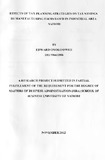| dc.description.abstract | This study focuses on the effectiveness of tax mitigation strategies on tax savings by manufacturing firms based in industrial area Nairobi. It reveals how effective the tax mitigation strategies available to the manufacturing firms are in creating tax savings. The research was conducted through collection of both primary and secondary data from the manufacturing firms. Questionnaires were developed and given to the firms Finance Officers and completed. The population consisted of 30 randomly selected registered firms as per the Nairobi City Council records of 2012. A descriptive research design was adopted. In analysis and interpretation of the data collected, it was found that claiming capital allowances was not only the most effective strategy for mitigating tax but also the most widely known among the finance officers. The others: tax education, use of debt in capital structure and intelligent sourcing were found to be ineffective in creating significant tax savings. On intelligent sourcing, most firms cited lengthy procedures involved as the reason for ineffectiveness in creating tax savings. Therefore, the strategies laid down by the government in the ITA for creating tax savings were found to be ineffective and consequently contributing very little tax savings, and thus the manufacturers claims that the tax regime is oppressive is valid and requires the government to address it. | en |

